Gender-bending in my anime?

It’s more likely than you think.
From anime to movies to video games, it seems we can’t escape traps and dickgirls. But what’s the deal with (airline peanuts?) Japan and androgyny? It might be dull and uninteresting to pay attention to history, but we should probably start at the beginning.
Let’s not pretend Japan came up with gender-bending. Shakespeare employed plenty of (prepubescent) boys to play his female parts. Did either he or 16-17th century England have the hots for boy? Perhaps not, but it wouldn’t be surprising considering the Greeks and Romans. That isn’t to say, however, that England was the first to embrace gender-bending, but only that this was one of the many famous examples of androgyny throughout history. Taking into consideration Japan’s cultural history, it wouldn’t be a stretch to say Chinese politics and its eunuchs gave some lasting impressions, but I’ll leave that to a greater history buff.

Welp.
For me, and this entry, the setting must start at the roaring 20s with its bourgeois culture and decadent sexuality. The seeds of postmodernism was planted in the European avant garde, starting with a “disdain for conventional bipolar views of manhood and womanhood.” Everyone remembers Un Chien Andalou for its one (literally) eye-popping scene, but don’t forget the subversiveness of the rest of the film, including the titular hero appearing in a skirt and a nun’s headdress.

The androgynous craze was hardly limited to weirdo movies. Virginia Woolf championed, “A mind that is purely masculine cannot create, anymore than a mind that is purely feminine.” Consider, also, the tribulations of Emil Sinclair in Hesse’s Demian, who discovers his true self only through encounters with Frau Eva, the Jungian projection of anima or the the feminine archetype of the soul. What does this all mean? Well, androgyny entered the 20th century long ago with the Weimar Culture.
This new philosophy didn’t go unnoticed, especially in the Westernizing Taisho era of Japan. One has to first understand that Japan began its modernizing, as it left the Meiji era, through the rampant bureaucratization of everyday life. For the first time, high school became compulsory; likewise, yearly health checks for every youth. Under the pressure to catch up with Western political powers, Japanese leaders focused upon nation-building. Youth development became vastly important since children represented the future of Japan. What resulted was a very pragmatic discourse that strictly defined gender roles and proper normative behavior. Essentially, boys will be boys and girls gotta be moms.
Bourgeois culture loves to leak out of its boundaries, for better or for worse, and the androgynizing Western culture caught the attention of many in Japan, especially for its “qualities of hysteria, temperamentality, and nervousness that departed from the inspid character norms of an earlier era.” Even then, however, it was nothing new. It was simply digging away at an old reality of Japanese consciousness. Japan has always had a certain fascination with gender ambivalence, starting with the gender impersations in the Kabuki theater. Even the advent of Confucianism’s codes and conducts only resulted in sexual confusion in the urban pleasure quarters of the 1600’s. While Meiji leadership did its best to crush the exploration of sexuality, the influences from the West in the 1920’s only served to awaken it. And it woke up in Japanese youth.
Of course, such changes prompted massive amounts of discourse on both sides about the implications of androgyny on development of Japanese society. Scholars who fancied themselves “Neo-Kantians” wrote extensively on the change: “…the development of culture is prone to a reduction of the previously existent distinctions between male and female culture. Herewith arises the so-called feminization of civilization.” Many were beginning to realize that gender roles were constructed by culture rather than nature, and thus it is only culture that can destroy these barriers. Others, however, wrote derisively against the social change, “warning of dire social consequences should nothing be done to curtail the ‘unnatural’ excesses of Taisho culture.”
Fantastic history lesson, right? So you might be thinking, “What’s the point? What does any of this have to do with anime? I only came here to drool over Kyonko pictures and all you’ve given me are crusty old portraits of Chinese eunuchs and weird Frenchmen!”
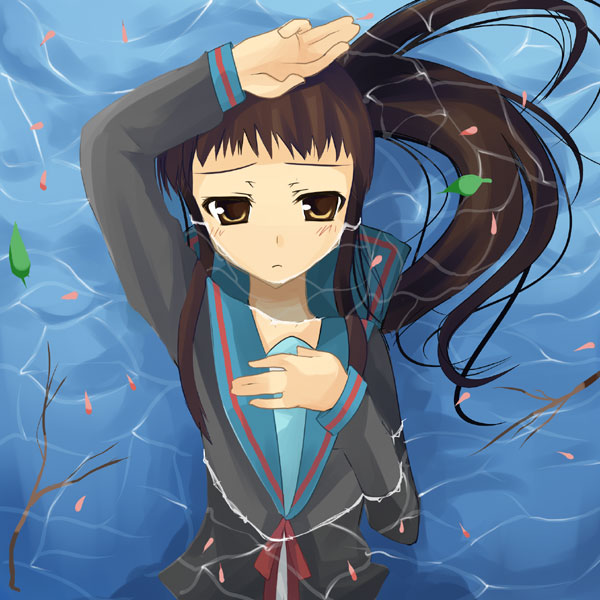
Well, for the detractors of Japanese cultures, prone to calling it creepy or weird, the first point of my entry is that androgyny is nothing new. As society develops, culture will slowly chip away at socially constructed gender roles. Japanese androgyny dates back centuries ago, and even modern androgyny (and I use modern in the historical sense rather than how you’d normally interpret modern) dates back to the 1920’s, thanks to the influences of the bourgeois West. Yep, all of you in the West who bitch about how creepy gender-bending is… it’s kinda your fault.
The second point of the history lesson is that androgyny usually comes with a cultural evolution. People explore their boundaries and try to discover who they really are. In essence, they challenge normative values that too often was dictated by authority. Androgyny isn’t about being “gay;” it’s about freedom, sexually and spiritually. Why can’t a man cry if he’s truly in emotional pain? ‘Cause it’s gay? That’s a dumb excuse.

Ichigoooooo~
With the second point in mind, however, we must now turn and wonder if the current gender-bending craze in anime captures the same spirit as its 1920’s cousin? When we fawn over Kyonko or champion Ouran High School Host Club for its cross-dressing and “reverse harem-ness,” are we truly deconstructing, reversing and exploring gender roles?
Let’s first take a good look at Kyonko. Kyon is known and often lauded for his sarcastic demeanor and superior masculine qualities, especially when compared to other harem leads. The result of his gender-bending renders Kyon (now Kyonko) into nothing more than a regular ol’ tsunderekko. While his personality hasn’t changed, he becomes the object of advances from both Haruhi (Haruki too?) and Koizumi (assuming that he hasn’t gone off the gender-bending deep end either). His status as a female, both physically and emotionally, makes him stereotypically weak in the eyes of the nerds who conceived him. As a result, Kyonko’s rough demeanor just gets played off for moe hijinks.
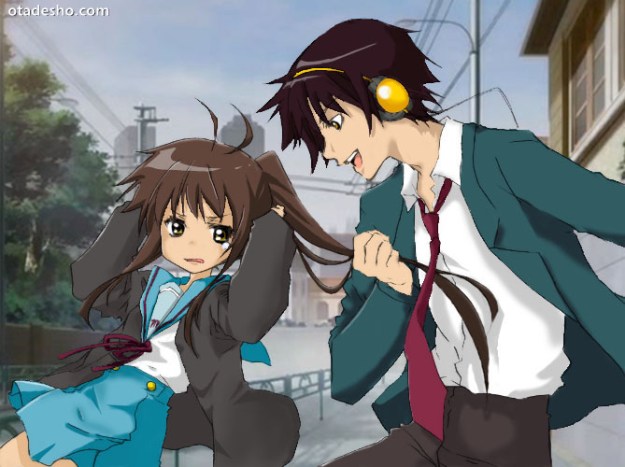
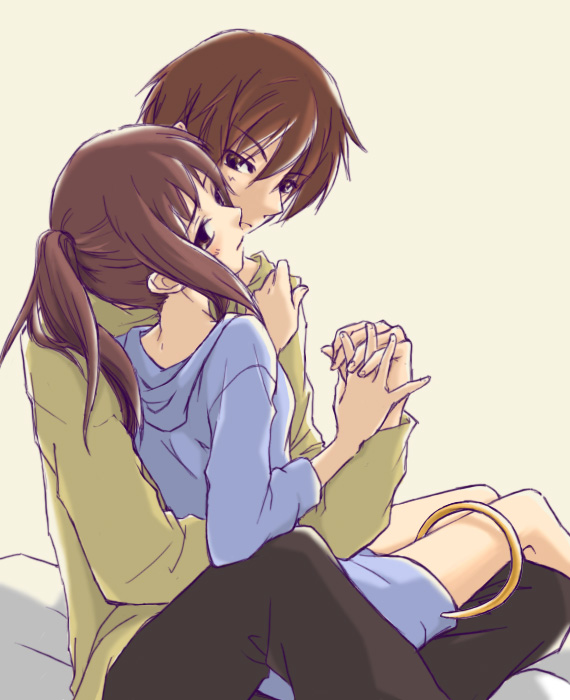
This is sexual harrassment, folks. But it’s funny cause it’s just Kyon(ko), right? Wait, no, it’s still sexual harrassment. Rather than explore or deconstruct gender roles, what people have done to Kyon(ko) here is merely reject traditonal male roles for submissive female norms. In essence, this is a trivialization of female gender roles; in adopting them, for our visual pleasure or even if we identify more with Kyonko than Kyon, we are merely endorsing them. It maintains a status quo with the small twist that we want to participate in rather than exploit the traditional female roles (but still exploited by others). While the perpetuation of gender norms in Kyonko’s case isn’t perhaps maliciously or overtly intended, it accomplishes its goal nonetheless.

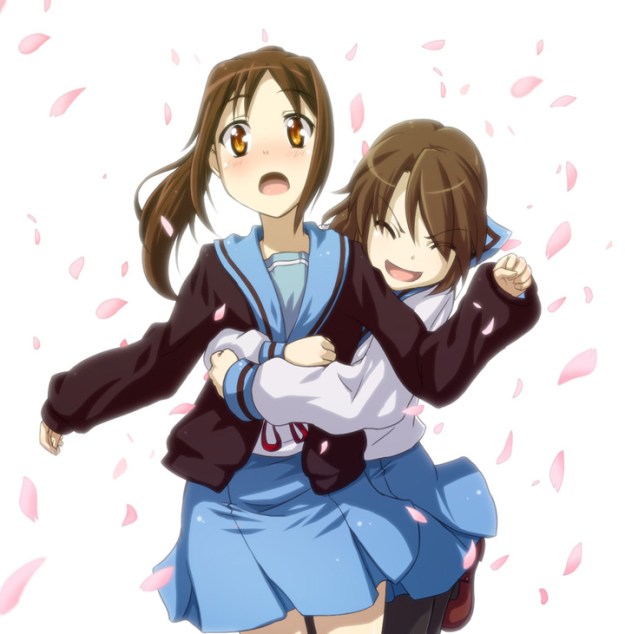
A hug... how embarrassing! Uguu~
It is interesting to note that the majority of Kyonko pictures features her blushing or merely in a position of great embarrassment and shame. Does Kyon blush over his male body? The answer is clearly no, so why should Kyonko blush over her female body? While a man might be extremely shocked and surprised to wake up one day with a female body, it makes no sense to just blush. I’m not saying that Kyonko has no real reason to blush, but that she has no natural reason to blush. Shame and embarrassment are not naturally inclined to women, despite what some may think. It is a conditioned response to our society and upbringing that seeks to both punish and exploit women for their bodies; it makes no sense for a man who has never experienced a female body to suddenly feel shame naturally. Shame only comes at the realization of the social definition of the female, the socially-recognized weaker gender. Kyonko blushes because she has lost status in the world; Kyonko is self-hating.
If Kyonko is merely a product of the feverish minds of fans and therefore unconvincing, we can simply look at the father (mother?) of gender-bending anime: Ranma 1/2.

Who could forget this classic anime? Ranma 1/2 plays itself off as merely comedy, but the message that comes across is horribly cruel and alienating. Ranma, the boy-turned-girl if you splash water on him, faces constant doubts and ostracization from family and friends throughout the anime. His friend, at one point, angrily exclaims, “Stop talking like a homo,” while Ranma’s father shouts at another point, “You have betrayed the honor of this house.” The comedic elements serve only to distract from what should be a traumatic experience. We are thus conditioned to see Ranma as non-normative.
At the very surface, the anime is aware of the gender boundaries in contemporary Japan. When Akane, the main (true) female character of the story, first learns that Ranma is really a boy, she refuses to be his friend.
Ranma’s ‘discord’ between image and reality is literally enacted for him in his constant transformations and is further emphasized by the reactions of those around him who, as we saw in the first episode, become puzzled, shocked, or even angry upon witnessing his metamorphoses… Neither boy nor girl, Ranma occupies a liminal space that… is actually a forlorn and isolated one… why can’t Akane be friend with him now that she knows he’s a boy? The answer lies in the strict gender construction on which his and Akane’s world is based. — Susan Napier
The show’s few elements of gender equality are easily dwarfed by rampant misogyny. Akane, the main (real) girl of the story, struggles admirably to be a martial artist while fending off arranged marriages by her father, but this point is contradicted by Ranma’s family and friends constant lack of confidence every time he becomes a woman. What results is a conflicted message that often tells its audience that being a woman honestly isn’t worth it.
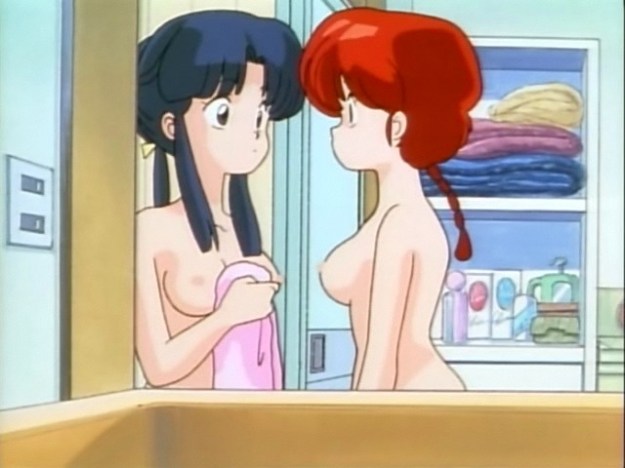
And like Kyonko, it Ranma’s new body is a constant source of shame and embarrassment, only played off cruelly as a joke. Throughout the history of media, the transformation from female to male, either literal or figurative, is usually seen as a means of empowerment. The flipside is the exact opposite, unfortunately.
[I]mpersonating a woman involves anxiety over loss of power, because it means that the male must identify with a typically lower-status figure. — Rebecca Bell-Metereau
This should be no mystery whatsoever. For instance, many men still view housework as feminine and thus degrading. While new media representations arise everyday that give a favorable view of “stay-at-home dad’s,” the dominant viewpoint of society is that femininity is weak.
So are there any positive representations of gender-bending in anime? Many might point to Ouran High School Host Club, but I would contend otherwise.

Simply because a girl is at the center of the harem of doting males hardly reverses any gender role expectations. As far as moe is concerned, Ouran is no better than Tenchi Muyo. Characters are still pre-determined by their moe qualities along typical anime cliches for the excitement of the anime’s audience. Rather than truly questioning and challenging harem anime and the society that loves them, Ouran merely exploits. At every turn, the anime strives to apologize for its transgressive themes. Haruhi’s “abnormal” male behavior and willingness to cross-dress is explained away by her transsexual father. As is typical in anime, anything strange is explained away by some dark secret or past, implying that otherwise, Haruhi would just be another normal girl.
There are a lot of fans of gender-bending in anime today. And a lot of these people probably won’t give a damn what has been written here. But it is nevertheless important to understand a couple of very key points. First, sexual titillation is merely a side product of gender-bending. Its most important goal is the unification of masculine and feminine qualities that have too long been set aside by those who deem themselves authority on how we should act as biological males or females. Second, the commercialization of anime and its penchant to exploit both men and women as products rather than complete human beings have led to a bastardization of the androgyny revolution. Where the 1920’s were about challenging normative values and gender roles, modern anime has us embracing traditional values in a package designed to turn us on.
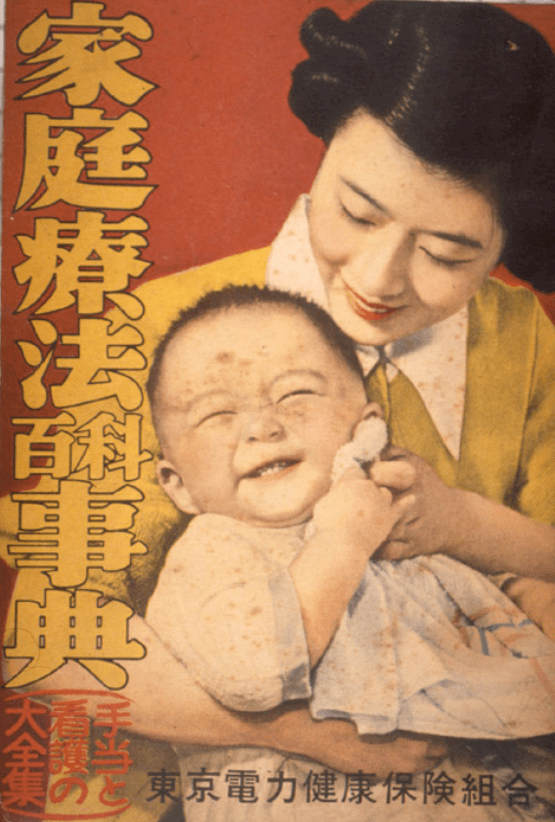
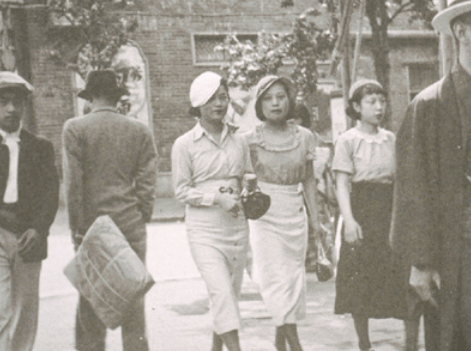
This is a really great post, thanks for putting so much work into it. It saddens me to see posts like this, and the one on the duality of male viewership, go largely unnoticed.
I never really knew much, or particuarly cared about feminist, or gender readings of fiction till I read this blog (the blog in general, not specifically this article), but now I’ve gained an appreciation for it, it’s a lens I can’t turn off, and it’s drastically changed the way I interpret a lot of anime for the better. I’ve found myself reading deeper into shows, and even often arguing about gender portrayal in various shows on forums and the like. I don’t think I ever properly thanked you for opening my eyes on this matter, and helping me see the deeper implications of many tropes and character types. So thank you so so much for your wonderful writing.
With the gushing session now over, I have got a few more specific things to say about this article.
Firstly:
“Many were beginning to realize that gender roles were constructed by culture rather than nature, and thus it is only culture that can destroy these barriers.”
To me, this quotation, along with many other parts of this post, suggest that more distinct gender roles are commonnly built up earlier in most cultures, with the breaking down of these roles a more modern occurrence. In particular what you said about the early Meiji era, and its “pragmatic discourse”, suggests to me that breaking down gender roles is somewhat of a luxury of wealth. I don’t have any statistics, or other evidence to support this, but I certainly feel like the poorer nations seem more likely to have more traditional, strictly defined gender roles. Assuming there’s anything in this assumption, wouldn’t that suggest that for basic survival, distinct, traditional gender roles are advantageous?
My other contention with the above quotation is the assertion that gender roles are constucted by culture. Now I don’t exactly disagree, but I’m not sure how well read you are on biology, and I, myself, have not explored the impact of the basic biological differences. I am a 3rd year student of Biochemistry and Microbiology, but neither have given me much of an insight into gender differences. Though I do know that some genes are present on the Y chromosome itself, for instance, which certainly has implications for genetic differences, I couldn’t say much else, but my studies have certainly taught me not to underestimate the significance of our basic biological nature. I haven’t read enough to really say, but it seems to me that the traditional, distinct roles for men and women are pretty common, at least in the early stages, to most cultures. Men are the hunters, fighters, protectors. Women are the child bearers, fruit and vegetable gatherers, etc etc. If this is the case, don’t you have to ask why this is so common? Aren’t basic biological realities, like the womb, the differences in natural muscle development, the differences in natural hormones etc etc factors that ought to be acknowledged? Isn’t it, perhaps, in some way, a matter of culture battling nature, as well as culture battling culture.
I’m certainly not saying that gender roles shouldn’t be questioned, and that the barries shouldn’t be torn down, just that we should acknowledge that it may not be an entirely unnatural state that we’re in.
Sorry about the long, rambling tone of this comment. Succintness is not my strength. Thanks again for the great read. I don’t know what the real life problems you’re dealing with right now are, but I hope they’re nothing too unpleasant, and that things are resolved well.
No, not necessarily. Let’s start off with how patriarchal societies came to be in the first place. Many historians and anthropologists seem to suggest that agriculture correlated with the rise of the patriarchal power structure. In hunting and gathering societies, “production” of food was shared by both genders, i.e. men did the hunting and women did the gathering. As a result, women usually had comparative influence in those societies. With the advent of agriculture, three things occurred:
(1) The birthrate had to increase. Agriculture required more manpower. Women had to spend more time rearing children.
(2) Agriculture meant men had to work longer and harder than, say, hunting and gathering. This shift redefined the work expectations of human society.
(3) Children often did little in hunting and gathering societies until they were able to help around their early teens. In agricultural societies, children could more readily work at younger ages, leading to the development of filial obedience or piety.
So to address your questions regarding “basic survival,” hunting and gathering societies sufficed. The human population was never in any danger of dying out barring a catastrophic natural event.
But the neolithic revolution led to the advent of civilizations! People settled down into communities! Our birth rate exploded with surplus food! Those who didn’t farm could concentrate on the development of culture and thought!
Yes, these are all true, but to suggest that these benefits are due to a patriarchal power structure is erroneous. They are all, like traditional gender roles, side effects of the neolithic revolution. The fact that most women had to rear children, and thus free men could sit down and think about the angles of a triangle doesn’t necessarily mean men are better than women at math, which I’m sure you already know.
In any case, I’m not an anthropologist. I can’t really answer your question on a deep level. My limited understanding is that gender roles are so deeply etched into the culture of early society that it’s hard for us now to shake off the shackles. After all, it has been passed down through families for over thousands of generations. We can’t just buck tradition in a day, but still, it’s worth trying! Regardless, I think I’ve answered the original question. Even now, there are matriarchal societies. Are they the best societies? That would depend on who’s doing the measuring.
But we’re in the 21st century. To view the sexes in terms of their “basic, biological nature” is vastly reductionist and unnecessary. So the male sex has evolved to hunt and the female sex has evolved to rear children. This is relevant as of 65000 years ago. In our day and age, it no longer matters. In a world of advanced mathematics and Godot, what does the “basic, biological nature” even mean anymore? In our multitudes of influences — from TVs to movies to magazines to the internet — bombarding our senses every second of every modern day, how much longer are we going to continue to hide behind the veil of biotruths, i.e. “Babe, I had to cheat — men were just coded to sow our seeds!” Yes, this teeny tiny vestige of a gene in the history of human evolution is what made me act like a chauvinistic piece of shit. Not the fact that my culture condones and celebrates that sort of behavior. There’s your commonsensical answer.
If the previous paragraph comes off a little adversarial, my exasperation isn’t directed at you specifically.
The stuff about the development of an agricultural society is interesting, and in general I will have to bow to your superior knowledge on the subject. I was merely suggesting that the prevalence of patriarchal societies, even if a side-effect, not the cause, may have been a probable, or even necessary side-effect of developments that did cause the advent of civilisation. Whatever the case, I agree it’s irrelevant in all but an academic sense, since it’s most certainly unnecessary and undesirable now.
In regards to what you said in response to my point about biology, firstly, I certainly wasn’t saying it should be used as an excuse for chauvinistic behaviour. That’s misappropriating my argument, reductio ad ridiculum, and pretty fucking offensive, especially since I hate that kind of behaviour more than anyone. I don’t understand what the extent of the biological differences are, I’d very much like to find out that they are negligible, that would make me enormously happy. However, to state that our biology is irrelevant is utterly absurd, and hugely arrogant. We may be extremely complex organisms, but we’re still the sum of our parts. It’s like saying that the circuitry and programming of a computer has nothing to do with how it operates. Using this as an uneducated defence for one’s actions is stupid and offensive, but to suggest we’ve out evolved our own biology is equally ridiculous.
Sorry is this comes across as aggressive, but you kind of set the tone here, and as a student of science I take offence to dismissing physical realities.
First,
wasn’t directed at you. I make assertions on very generalized, broad grounds, which is why I added this: “If the previous paragraph comes off a little adversarial, my exasperation isn’t directed at you specifically.” To elaborate even further, I was addressing what I perceived as a common argument from the layperson (again, not you), i.e.:
“If my eyes wandered, it’s because I was programmed to.”
One could reasonably argue, with varying degrees of scientific support, that men are programmed to sleep around (or at least have the greater inclination to do so). But our biology has also evolved to the point where we can develop complex thoughts and emotions not yet observed in any other animal. These same complex thoughts and emotions should help (I hope) a man realize that cheating on one’s spouse is immoral. I’m hardly brushing aside physical realities by implying that the latter (complex moral reasoning), a result of our biological brain, is more relevant to the nature of a 21st century man than the former (basic, biological differences).
I didn’t say this. I said that our basic, biological differences are irrelevant with regards to gender roles in the 21st century. After all, I believe that this is what we are discussing. Are women better caretakers because they have a womb? Are men better soldiers because they have bigger muscles? Who cares? No, seriously; I’m not trying to be flippant. Why are we asking these questions — other than out of pure scientific curiosity — when we have developed the technology to transcend these differences? Thus my assertion that they are irrelevant.
Can men breastfeed? No. But can men give their children the proper nutrition under the guidance of a physician? Yes. Should we hem and haw over the fact that a mother should be breastfeeding the child anyway due to the various antibodies and other such benefits within the mother’s milk? Others can, but I won’t. What qualitative difference does it make? When we enforce gender roles, it isn’t culture battling nature. Rather, it is an imbalanced power structure doing its best to maintain the status quo through the selective and thus fallacious use of science.
In our modern society, people should be free to do whatever they want to do regardless of what their basic, biological differences might have dictated since the dawn of humankind. Whatever ancient inclinations for gender roles were buried within our genes, they are, for all practicality, irrelevant to how we should function in an egalitarian society. This is hardly brushing physical realities aside. And I’m no less a student of science. If what I’ve said still offends you as a student of science, so be it.
Again, I never disputed this. Having said that, I’m not a proponent of physicalism in the mind-body debate, but that’s a larger discussion….
Nor have I ever said this.
Ok, I clearly misunderstood you to a certain extent. Sentences such as “In a world of advanced mathematics and Godot, what does the “basic, biological nature” even mean anymore?” certainly don’t help though. I fairly well agree with the specific scenarios you gave. I don’t think it’s irrelevant, even just in regards to gender roles. Genetic inclinations or the like quite possibly play a part. As I said, I don’t know, I’d like to look into it, but I certainly wouldn’t rule it out. I certainly don’t think we should use this as an excuse to limit people’s roles, or to treat them as any less than a whole individual. Obviously people should be free to do whatever they want, regardless of their gender, and this is the most important point.
I’ve kind of lost track of the main thrust of the debate in all this back and forth, I think we basically agree on the salient points. One of the problems I have with the various socialist movements around campus is their tendency to treat greed, envy, and all the less savoury aspects of humanity as social constructs, and sometimes I worry that people similarly act as if there is no difference between women and men. It really is academic though, the way we treat people should be the same regardless.
Thank you for taking the time to respond in the considered manner that you have. I certainly feel I’ve gotten a fair bit out of it.
“In a world where our culture no longer embraces greed, would man be greedy?” Well, we as humankind have been debating the answer to this question earnestly from even before Marx, but it’s worth noting a recent study:
You have to question, then, if the vast majority of babies are altruistic and inclined toward fairness, then at what point in our development did we start to embrace a culture where the 1% can control the majority of the wealth? That isn’t to say that there isn’t some biological basis for greed encoded in our DNA. This may certainly be the case, but the more informed socialists are more inclined to believe that society plays a larger role in shaping our actions. Even in the unscientific socialists, the ones likely to assert that greed is a pure social construct, I believe that they are looking at the bigger picture even if they refuse to acknowledge the subtlety around it, but I’m sure my position is certainly contentious.
Ok, you’ve added a few things since I started typing this response. Doesn’t really change my response though, just pointing out that that was typed without having read the various things you added.
My main flaws as a writer are that I am always re-editing and perpetually dissatisfied with what I have written.
I should probably add that my statement about being offended as a student of science was made in response to your argument as I had misunderstood it. I retract that entirely. I don’t exactly agree, but I can certainly respect where you’re coming from. I often find myself arguing with people who treat humans as transcendent, and really do brush aside biology and such. You’re clearly much better informed and reasoned than that.
Just saw your post about that study as I was about to hit post. That’s certainly an interesting study, and please don’t take me for one of those capitalism obsessed elitist scumbags who go around saying that inequality is the natural state, and that poor people are all poor becaues they’re lazy and stupid blah blah blah. I would gladly embrace some more left leaning policy here in Australia. I think the way we treat refugees and our indigenous populace is reprehensible. However, I just don’t think it’s wise to work on the assumption that humans are fundamentally good, or moral creatures. At the end of the day we will do what benefits us, and while we certainly won’t go out of our way to be malicious, I think we can and will sacrifice others directly and indirectly for our own good. I still think we can manage things a whole lot better than we are though, obviously.
Haha, I certainly don’t think that. Nope, no way. We do have the capacity for moral thought. Whether we seize the opportunity or not… well, we can see the results for ourselves.
Even the so-called “soft libertarian” Friedrich Hayak supported certain socialist measures because he understood that lifting up the bottom of society can only benefit those at the top. The pursuit of wealth is not necessarily opposed to fairness, though I’m well aware that you have advanced no such argument. All I’m saying is that at the end of the day, there are people willingly thrusting themselves into burning homes to save strangers. At the end of the day, the shopkeeper refrains from ripping off the child because he knows it isn’t right. But you’re also right that for some people, they will willingly sacrifice others for their own sake. What explains this disparate conclusions about human nature? I’ve been (self-indulgently) re-reading my old posts and I came across something that might be pertinent to the discussion at hand:
Again, a contentious assertion, I’m sure, but I would draw the parallel with greed. We can either use our human brains’ capacity for moral reasoning to further society’s ends, or succumb to our animalistic instincts for greed and self-preservation. I suppose I can see the argument as to how complex thoughts transcend our basic biological nature, but at the end of the day, our (quite organic) brains developed those thoughts. As far as I’m concerned, it’s all biological.
I should probably clarifly that I was in no way aiming that statement at you. It was aimed more at the various socialist groups I’ve argued with around campus.
There’s not much here for me to say. I basically agree, in particular about how raising up the poor benefits all of society.
Good post. There’s only one thing I wanted to point out–since you start off with it–is that “gender bending” wasn’t what England was going for with the Shakespeare thing. The reason boys (and I mean boys, not men) played women parts in plays was because the theater was considered trashy for women. Any woman to play a part in the theater could look forward to a lifetime of being looked down upon, equal to prostitutes. So instead boys, whose voices had not yet hit puberty and so had not deepened, played the parts of women and girls in plays. So, the reason didn’t have to do with gender in terms of sexuality–like with the eunuchs and such–but as much as what was decent and not decent for a woman to do in that time period and in that part of the world.
Good to know.
Very interesting article.
I very much agree.
I find discussion about woman and man gender roles is a tough subject.
We want woman and men to be equal, but equal seems to mean that woman need to do the things men do. (Even though it seems to go the other way around to right now. Commercials are trying to persuade men to spend more time on there appearance too. …At least man and woman will become equal in a consumer way)
And what if there really is a difference between man and woman, for example in thinking or acting, is that necessarily a bad thing? Besides the fact that man and woman have different bodies, different composition of hormones (testosteron, oestrogen), man usually have a stronger built than woman. The underlying problem I have with most anime, and genderbending anime (, commercials, films, et cetera), is that the womanbody in our society very very oversexualized.
i think I’m probably arguing angainst a strawman here, but still felt the need to say this.
I’ve been reading a book about history development of woman and men in our society,
from Ivan Illich – Gender. E Minor, I think you might be interested in it.